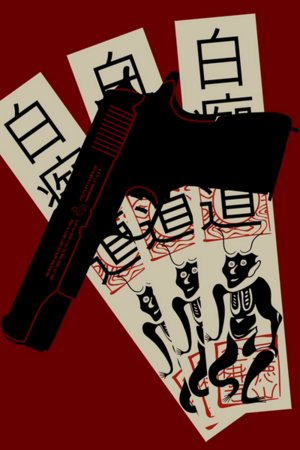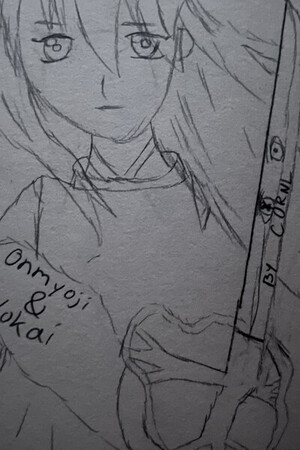Chapter 4:
The Blacksmith's Wife
Travelogue of an Apostate
A few days after the incident at the gatehouse, Lavenza and Deme arrived at a village that did not exist on their map. Deme flipped a wide piece of parchment sideways then upside down.
“Are we lost?” she asked. “Did we go the wrong way?”
“I don’t believe so,” Lavenza answered. “This village looks new.”
“Look!”
Deme pointed. Across the brook along which the village was built, down a stretch of blood orange sand, then up a winding limestone staircase carved into a rocky ridge, sat a fortress looming over the town. Beneath the glow of the weakening sun, the stain glass windows surrounding the keep ignited with molten metal and mellow sapphire.
“Ostigan Castle,” Deme motioned to the map. “Are we in the right place?”
“Strange,” Lavenza muttered.
“You think maybe Ostigan’s lord built this place?”
“What lord?” Lavenza scoffed. “Come on.”
Many of the buildings on the village outskirts featured unfinished elements. Doors, windows, walls. Weeds flourished in untilled soil fenced off by loose, sanded planks. As they ventured further, the two came across a row of cottages lined behind a tavern. Empty wooden benches hid beneath a covered patio.
Each cottage was constructed the same way, with a thatched roof nestled over a round, stone foundation. The lack of decoration. The absence of smoke from any of the red brick chimneys. Lavenza did not need to peer inside darkened windows to know that no one lived here.
At the far end of the village, where paved dirt ended and the old path long overgrown with foliage began, Lavenza and Deme heard a rhythmic clang and upbeat whistling. Fumes curled from a meager forge, its walls struck with streaks of soot. Finished horseshoes and rivets sat upon a workbench. The hearth beside it rested from the gasps of a bellow.
The whistling belonged to a woman, who stood over the anvil, banging away at a metallic bar clutched between her tongs. From the back, she looked lean, with only a winter’s worth of muscle, and she donned an apron and bandana whose floral stitchings seemed more appropriate for a kitchen than a forge.
“I’ll be with you in just a moment,” the woman said without looking. “There’s water on the table inside the house if you’re thirsty.”
Deme and Lavenza looked at each other, then welcomed themselves into the woman’s home. Deme dropped her knapsack in the vestibule. Lavenza parked her staff beside a wooden coat hanger. A pitcher sat on the table just past the hallway.
“It might be poisoned,” Deme whispered.
“Please,” Lavenza said. She helped herself to one of the glass cups on the table.
“Mysterious woman in the middle of an empty village? Offering us strangers water?” Deme hissed. “Use one of your spells! Check it.”
“Where does she even get poison? Tell me. The shrubs from down the road?”
Lavenza brought the water to her lips. Upon the first sip, she widened her eyes. Her drinking hand slammed her glass back onto the table while her other flew outstretched and convulsed. She fell to her knees, croaking and gurgling, raising her quivering hands towards Deme as if begging for mercy.
“That’s not funny, Lavenza.” Deme grumbled.
The apostate left her arms suspended for a few seconds longer. Then, they relaxed and fell to her quivering knees. Lavenza’s contorted expression resolved into a grin. Even her tattoos took on the shape of mocking smiles.
“It’s not poisoned, child,” she chuckled.
“It’s. Not. Funny,” Deme repeated.
The clanging outside stopped. There was the creak of tugged rope. The bellows roared to life. Lavenza heard the crackle of smoldering coal and then the long hiss of hot metal dropped into a barrel of water.
“Good enough,” came a murmur from outside.
The woman appeared at the doorway. She wobbled inside with her hands resting on her protruding belly.
“Sorry,” she said, "didn’t mean to ignore you. Rarely get visitors these days. I’m Ariadne. You two passing through?”
“We were hoping to camp here tonight,” Lavenza replied. “We were surprised to find a village.”
“’Tis a good spot,” Ariadne nodded. She raised her gaze at the evening sun. “Was supposed to be a traveler town right by the river. Only halfway finished when we were told about the Endire. Construction practically stopped the next day.”
“And the local lord?”
“Gone. First thing that following morn,” she replied. “You’re looking at the last two folk in Ostigan.”
“You’re expecting?” Deme asked.
“Around summertime,” Ariadne smiled. “My husband runs the forge, but he’s gone away to fetch us a midwife and carriage and some horses. Take us all the way to Centa Muis, he said.”
Lavenza stiffened.
“How long ago was that?” she asked.
“Several months, I reckon. I suppose he should be back soon, when the frost weakens its hold on the mountain pass. Buncha folk trickle through that way. Magic folk particularly. I keep the forge running. Replace horseshoe and broken wagon in exchange for fresh food. It beats salted pork and canned beans.”
“I hope you don’t mind us making camp tonight then,” Lavenza said.
“Course not. In fact, you’re free to use the tavern,” Ariadne suggested. “There are furnished rooms on the second floor and a kitchen on the first. Innkeeper won’t mind. He’s not coming back.”
“We’ll just be staying the night,” Lavenza rose to leave. “Thank you for your hospitality.”
“Good luck!” Deme called to the blacksmith’s wife as they departed. “She seems nice, Venz.”
“Earlier, you thought she was trying to poison us.”
“I’m allowed to change my mind!”
Dinner that night was seared rabbit leg with roasted potatoes, courtesy of the tavern’s brick oven and open fireplace. Deme especially appreciated that the kitchen was stocked with quality firewood and seasoned their meal with dried herb scraps stored in the basement.
“You think we should invite Ariadne for dinner?” Deme asked. “We should, shouldn’t we, Venz?”
Lavenza wasn’t listening. The apostate levitated her fork and knife above her hand while she gazed out the tavern window. Half a field away, she caught the flicker of candle light peeping out from Ariadne’s home.
“Lavenza?”
“He’s abandoned her,” she finally said.
“What?”
“He’s left without her,” she sighed. “The blacksmith. Her husband.”
“What a horrible thing to say!” Deme frowned. “How would you even know?”
“What husband leaves their carrying wife for months?” Lavenza growled. “A carriage to Centa Muis? He could have at least come up with a more convenience excuse.”
“The Royal Decree—”
“Does not apply to the unborn,” Lavenza cut her off. “Deme, it is what it is.”
“You don’t know that,” Deme stressed. “You could stand to have more faith in people, Venz.”
“Faith is reserved for what's left of the Endire,” Lavenza replied. “What have people done to deserve it?”
“You’re a person. I have faith in you.”
“You shouldn’t,” Lavenza smiled. “I’m not hungry, Deme. I’m sorry. You can have my portion.”
Lavenza retired to one of the rooms upstairs and locked the door. Deme stared blankly at the extra potatoes and rabbit leg sizzling on the tavern skillet. After finishing her own food, Deme packed Lavenza’s portion into a modest bowl and found herself walking through the dead of night to the only lit window on the other side of the village, where she knocked on Ariadne’s door.
“Can I help you?” answered the blacksmith’s wife.
“We had some leftovers,” Deme murmured. “You can have these if you’d like.”
“You shouldn’t have,” Ariadne replied. “Thank you. It smells lovely. Should I…?”
“No, no,” Deme shook her head. “You can keep the bowl. It belongs to the tavern anyway. I just wanted to ask you a question.”
“Yes?”
“Your husband,” Deme said. “Is he a good blacksmith?”
Ariadne chuckled.
“I wouldn’t be a good wife if I didn’t say yes.”
“But does he forge any special armors? With Rafta?”
“Rafta?” Ariadne blinked. “I’ve never heard of such a thing, child.”
“Oh.”
Deme tried not to sound like her enthusiasm had trailed away, but her disappointment leaked out like a broken dam. Ariadne saw it, even in the dim hours of the night, and took it as her queue to withdraw.
“Thanks again for the food,” the blacksmith’s wife chuckled.
“Maybe when your husband comes home, you can ask him to cook this,” Deme suggested. “It’ll give you and your child strength.”
There was no pause, no hesitation, no flicker of doubt between her fingers. Ariadne responded with temerity, with some noble emotion that Deme could not fathom.
“Yes,” she smiled. “I think I’ll do that.”
When Deme returned to the tavern, she saw candle light up on the second floor. The window in Lavenza’s room lay ajar and faced the forge. Deme did not see the apostate, but she imagined Lavenza sitting just shy of the window edge, perhaps at her wooden desk, with her elbows leaning against the table and her free hands pressed into her cheeks.
Deme stayed outside for a while, her thoughts buried amidst Lavenza’s troubling prediction. Lavenza had to be wrong. Of this, Deme was certain; the world couldn’t be as cruel as the apostate claimed. The child circled around the tavern several times to clear her mind until the light from the forge faded. The lights in Lavenza’s room extinguished in quick succession. Only then did Deme cross the threshold back into the tavern, tiptoe up the stairs, and slip beneath her sheets.




Please sign in to leave a comment.